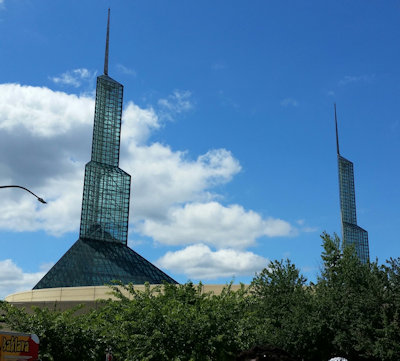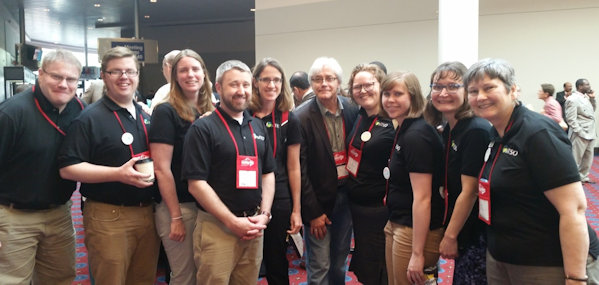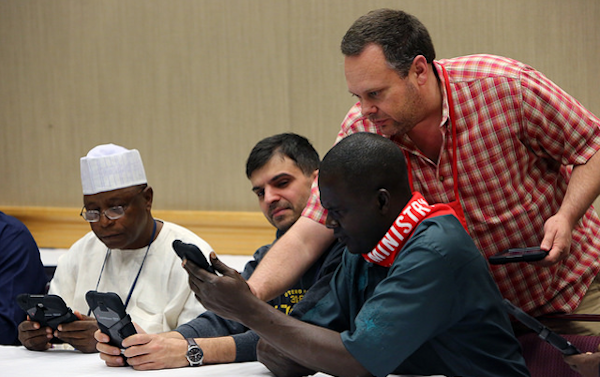The focus of this month’s Perspective on Hope … new relationships can help cure spiritual fatigue and blindness.
REV. DR. JEROME (Jerry) DEVINE
Director Connectional Ministries, Detroit Conference
“Blessed are your eyes, for they see, and your ears, for they hear.” [Matthew 13:16, NRSV]
Have you ever become so familiar with your surroundings that you tend to not notice anything new? Or, have experiences ever caused you to become a bit cynical that hope can emerge from current trends or circumstances? It can happen to the most idealistic and passionately committed among us.
I am writing through the lens of having worked with others for two weeks at General Conference 2016. Even before you read this you will likely have heard multiple stories of what took place or someone’s version of what took place in Portland. While this was my fifth time of participating in this gathering, it was my first time of focusing particularly on the worldwide nature of the church.

I was part of a team brought together by the General Commission on Religion and Race to offer insights and dialogue around what it really takes to be an authentically engaged community of faith that is now actively growing in multiple countries on several continents. Intercultural competency and vital conversations are hard work.
To place this in perspective consider how we view regional uniqueness and diversity here in Michigan. We talk about how we value the Thumb, Mid-Michigan, Metropolitan Detroit and Southeast Michigan, the Upper Peninsula, Northern Michigan, West Michigan and each of the Great Lakes shoreline communities. When we use “church speak” we may refer to urban, edge city, suburban, extra-urban, town & country, rural, etc. We acknowledge “affinity groups” and shared cultural values.
Yet, in the midst of these variations we are also Michiganians [I prefer this term over Michiganders, which reminds me of a male goose!]. While we currently have 12 districts and two conferences here in the Michigan Area, we are on a journey to create one vibrant connected community of faith state-wide. We are United Methodists in Michigan! In our diversity there is unity, just not uniformity. This is healthy, yet it is hard work.
“What is difficult for many is that this also requires humility and ambiguity, and those are hard values to live out if we want to be right all the time.”
Now, write this same idea large and you begin to glimpse the complexity of a worldwide church. Multiple cultures within regions and within individual annual conferences gathering to understand and explore how to be united in mission in the world takes considerable capacity to listen and not assume. It requires a willingness to see one another as beloved disciples of Christ, each created in God’s image. What is difficult for many is that this also requires humility and ambiguity, and those are hard values to live out if we want to be right all the time. Is it possible that in our desire to be extremely faithful in our response to the call and command of Christ to “Go, therefore, into all the world…” that we sometimes fail to remember that we each live out of an enculturated view of the world and of the Gospel?
The United Methodist Church has given me an opportunity to travel in multiple countries worldwide, as well as across the five jurisdictions here in the United States. General Conference 2016 provided multiple ways to deepen those connections. Yet it also revealed considerable tension as talks of schism circulated and planned manipulation of our denomination began to materialize. Admittedly, I arrived for General Conference very uncertain about how the tactics of politically motivated groups from polarized opposite positions would alter our course in history. In my lifelong love for and passionate commitment to The United Methodist Church I was struggling to see as clearly as was needed.
Then early on the first day my hope was rejuvenated and my commitment to looking for the best in our midst was rekindled. It was a serendipitous, holy coincidence that brought me to Burgerville for a quick Tuesday morning breakfast on the way to the convention center. There I encountered a group of seminary students from the Methodist Theological School in Ohio. They were obviously enjoying the moment and allowed me to enter their conversation. I was swept up into their energy, hunger for knowledge, hope for our Church and their love for each of their distinctive ministries. They allowed me to walk with them to the convention center as I asked what must have seemed like a thousand questions.

Their callings and passions ranged from local churches they were serving to environmental justice and care. They were interested in rural small churches and multi-cultural counseling. They were part of a class on United Methodist Polity, and were at General Conference to gain deep experiential insights into the workings of our connectional way of shared life and ministry. Their depth, range and energy for ministry were humbling and invigorating. They reminded me very quickly of why I am a United Methodist and why I care so deeply about how we shape our future. Even more important, they removed the cynical or apprehension scales that were preventing me from seeing God clearly at work during General Conference.
You can read some of their insights from General Conference here.
No matter what would take place in Portland these seminarians knew that God had called them to bring God’s transforming grace into their places of ministry and influence. Parliamentary procedures and political positioning will not stop God and it seemed clear to me that it would not stop this great group of servant leaders. Near the end of the first week they agreed to join me in a photo opportunity. I warned them that the hope they gave me would make it into this blog.
If you find yourself unable to see something new where you are, spend some time with some young adults who are eagerly following God’s call upon their lives. You will again have eyes to see and ears to hear the hope that God is bringing about every day!
Last Updated on December 15, 2023

